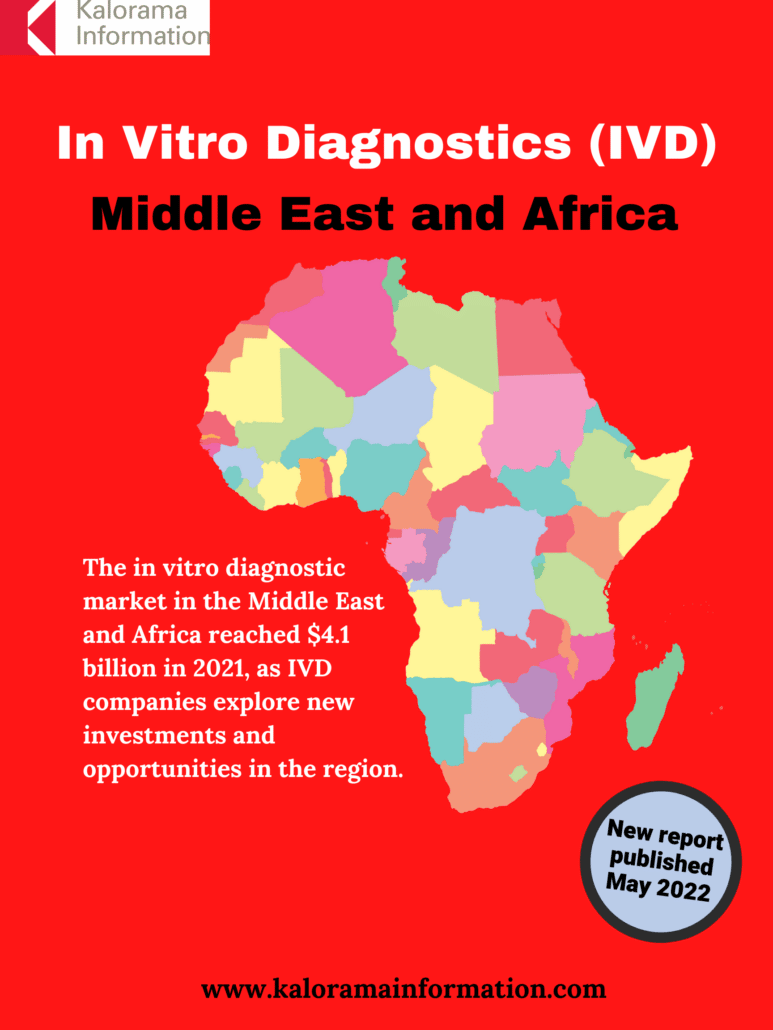The Middle East and Africa Region a $4 Billion Hotbed for IVD Investment
Globally, in vitro diagnostic (IVD) companies are exploring opportunities in developing countries, where rising incomes and standards of living have sparked a new health consciousness and growing demands for quality medical care. As the COVID-19 dust settles, it is expected that the interest in geographic expansion will once again return to the Middle East and Africa region. This is an important region where the market for in vitro diagnostics reached an estimated $4,126 million ($4.1 billion) in 2021 and is expected to grow 2.2% compounded annually through 2026, according to leading medical market research firm Kalorama Information in the report, In Vitro Diagnostics (IVD) in the Middle East and Africa.
In the Middle East and Africa, lifestyle changes–a more sedentary lifestyle resulting in rising obesity rates–has brought about the emergence of “Western” diseases such as diabetes. Thus, there is growing demand in the region, therefore, for medical tests.
“In the IVD industry, emerging markets are currently the major source of market growth. Opportunity for innovation, as well, exists in emerging markets, where acceleration of new products is the largest mid- to long-term driver of value.”
Kalorama Information
Major IVD companies have reported growth in Turkey and Saudi Arabia, considered two of the top seven emerging markets. These countries continue to invest in healthcare infrastructure and insurance coverage for a growing and increasingly more affluent middle class.
In developing markets, including those in the Middle East and Africa, with increased demand for healthcare has come increased access to it. In the 1970s, many countries in the Middle East and the Gulf countries started down a path of providing public healthcare to citizens. Countries such as, Oman, Saudi Arabia, Qatar, Iraq, Syria and Turkey all have universal healthcare programs. Much of urban African regions followed closely behind. This development requires increased investment in healthcare. This increased investment most often takes the form of government tenders, which remain a major source of supply for state-controlled labs and hospitals.
IVD manufacturers can expect new availability of tests and test systems designed for use in resource poor settings worldwide; increased consolidation of healthcare services throughout the world, developed and emerging economies included, and thus, increased pricing pressure on all medical devices, including IVDs; and increased availability of healthcare insurance in emerging countries, providing an opportunity for expansion of the IVD market to serve the growth in people who have access to healthcare.
Despite all this interest, investment, and opportunity, the Middle East and Africa still remains an underserved region with large market potential.
About the Report
This new report (published May 2022) provides an overview of developments in the in vitro diagnostics industry in the Middle East and Africa. For more information or to purchase In Vitro Diagnostics (IVD) in the Middle East and Africa, visit: https://kaloramainformation.com/product/in-vitro-diagnostics-ivd-in-the-middle-east-and-africa/.
Six segments of the IVD market in the Middle East are examined in the report:
- Clinical Chemistry
- Immunoassay
- Microbiology
- Point of Care (POC)
- Histology – traditional stains
- Other (includes nucleic acid assays, blood bank ABO, sequencing, prenatal tests and other areas not covered specifically in the above segments)
The countries and regions examined in the report include:
- Egypt
- Iran
- Iraq
- Israel
- Jordan
- Saudi Arabia
- South Africa
- Turkey
- United Arab Emirates (UAE)
- Other Mideast (Bahrain, Cyprus, Gaza Strip, Kuwait, Lebanon, Oman, Qatar, Syria, West Bank, Yemen)
- Other Africa (Algeria, Congo, Sudan, Libya, Chad, Niger, Angola, Mali, Ethiopia, etc.)


